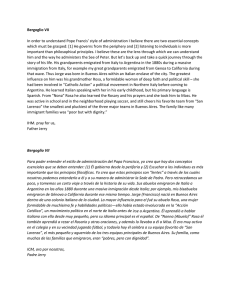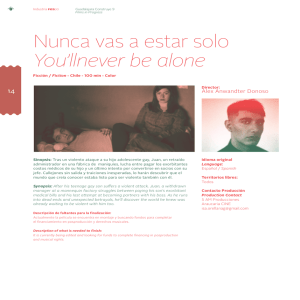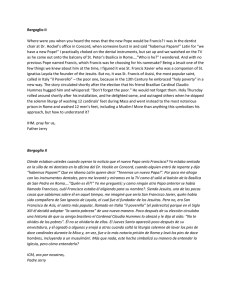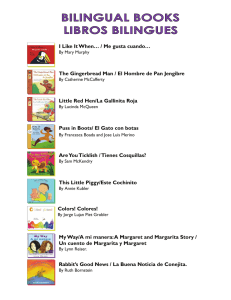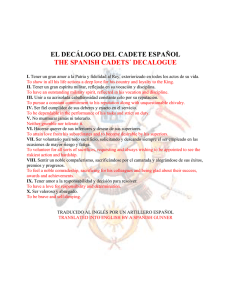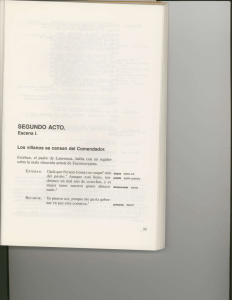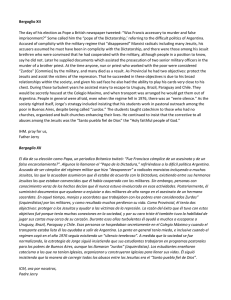Libro bilingüe inspira sonrisas en pequeños pacientes
Anuncio
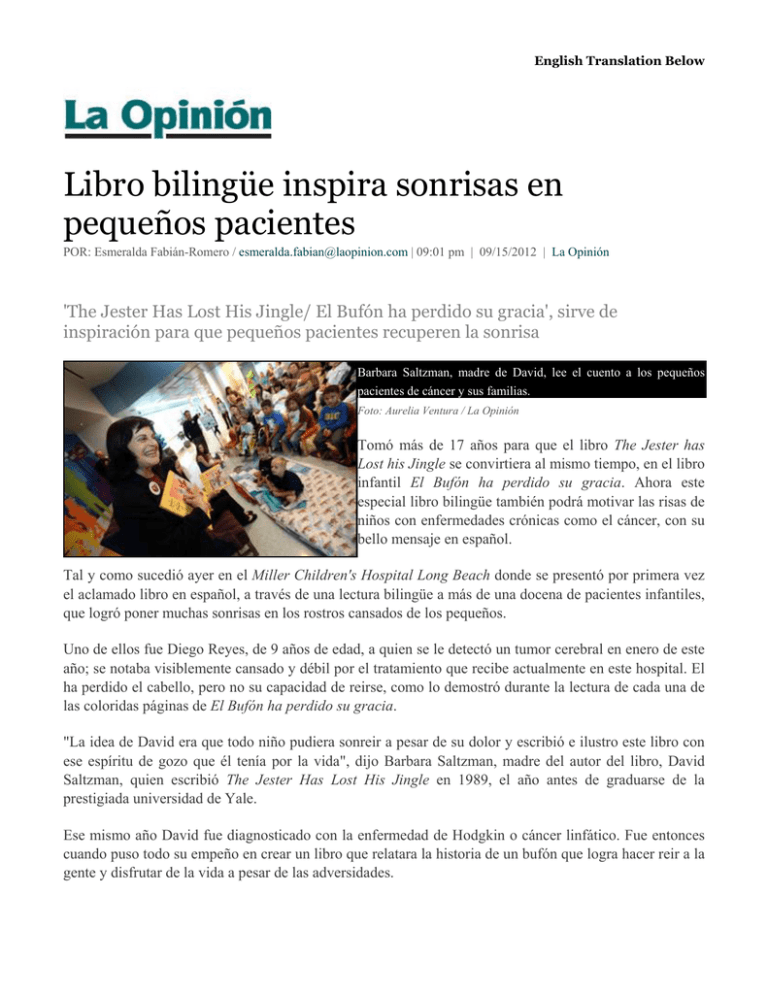
English Translation Below Libro bilingüe inspira sonrisas en pequeños pacientes POR: Esmeralda Fabián-Romero / [email protected] | 09:01 pm | 09/15/2012 | La Opinión 'The Jester Has Lost His Jingle/ El Bufón ha perdido su gracia', sirve de inspiración para que pequeños pacientes recuperen la sonrisa Barbara Saltzman, madre de David, lee el cuento a los pequeños pacientes de cáncer y sus familias. Foto: Aurelia Ventura / La Opinión Tomó más de 17 años para que el libro The Jester has Lost his Jingle se convirtiera al mismo tiempo, en el libro infantil El Bufón ha perdido su gracia. Ahora este especial libro bilingüe también podrá motivar las risas de niños con enfermedades crónicas como el cáncer, con su bello mensaje en español. Tal y como sucedió ayer en el Miller Children's Hospital Long Beach donde se presentó por primera vez el aclamado libro en español, a través de una lectura bilingüe a más de una docena de pacientes infantiles, que logró poner muchas sonrisas en los rostros cansados de los pequeños. Uno de ellos fue Diego Reyes, de 9 años de edad, a quien se le detectó un tumor cerebral en enero de este año; se notaba visiblemente cansado y débil por el tratamiento que recibe actualmente en este hospital. El ha perdido el cabello, pero no su capacidad de reirse, como lo demostró durante la lectura de cada una de las coloridas páginas de El Bufón ha perdido su gracia. "La idea de David era que todo niño pudiera sonreir a pesar de su dolor y escribió e ilustro este libro con ese espíritu de gozo que él tenía por la vida", dijo Barbara Saltzman, madre del autor del libro, David Saltzman, quien escribió The Jester Has Lost His Jingle en 1989, el año antes de graduarse de la prestigiada universidad de Yale. Ese mismo año David fue diagnosticado con la enfermedad de Hodgkin o cáncer linfático. Fue entonces cuando puso todo su empeño en crear un libro que relatara la historia de un bufón que logra hacer reir a la gente y disfrutar de la vida a pesar de las adversidades. "Lo mejor que podemos hacer en la vida es disfrutarla ...saber cuan importante es cada ocasión, cada momento, cada persona...", decía David sobre la vida, la cual él perdió ante el cáncer en marzo de 1990, a los 22 años de edad. Buscando cumplir el deseo de David, su familia, su padres y hermano mayor Michael, lucharon por publicar el libro de la manera exacta en que David hubiera querido, y lo lograron 5 años después de su muerte. Hoy, 12 años después, su familia ha logrado realizar la parte que David más hubiera disfrutado. Verlo publicado en inglés y español. "En la preparatoria uno de las cosas que David más disfrutaba era dar tutoría a niños latinos de primaria, del área de San Pedro, cuya primer lengua era español", recordó Saltzman. "él hubiera estado feliz de ver que su libro tuviera la traducción en español. "El idioma español y la cultura hispana es parte de nuestra vida familiar, la apreciamos mucho", añadió. Saltzman, quien se desempeñó como editora en el periódico Los Ángeles Times, destacó lo importante que era para toda la familia que la traducción al español fuera literaria, en rima y que mantuviera el espíritu de la historia. Fue por esa razón que pasaron tantos años antes de que se publicara en español. "Fue hasta que conocimos a Natalia Aurrecoechea, quien se ofreció a hacer la traducción y lo hizo maravillosamente", dijo la madre del autor sobre la traducción hecha por la profesora de origen Vasco. El resultado de la pasión por cumplir el sueño de David al pie de la letra, es un libro infantil bilingüe que no solo cumple con los más altos estándares literarios sino que cumple la misión de hacer reir a niños y adultos, que atraviesan por momentos difíciles como una enfermedad, en ambos idiomas. "Es un buen libro para la gente joven que enfrenta una enfermedad seria, porque fue escrita por alguien que sufrió una enfermedad así. Esta lleno de optimismo", expresó, el doctor en oncología pediátrica, Jerry Finklestein, de este hospital. Aquí se atienden unos 8,000 niños anualmente, primordialmente de cáncer o neumonía, indicó Divya Joshi, directora médica del hospital.Más del 60 por ciento de los paciente son niños de origen hispano. Además de una sonrisa, a la paciente Natalie Flores, el libro le despertó el gusto por leer. "No me gusta mucho leer , pero de este libro me gustó todo", dijo la niña sonriente mientras abrazaba el libro que le fue obsequiado. Candice Ivarra tiene solo 16 meses y sufre de cáncer al estómago. Pero la pequeña disfrutó de la lectura de ‘The Jester Has Lost His Jingle/El Bufónha perdido su gracia’ Foto: Aurelia Ventura / La Opinión Bilingual book inspires smiles in young patients By Esmeralda Fabián-Romero / [email protected] | 09:01 pm | 09/15/2012 | La Opinión “The Jester Has Lost His Jingle/El Bufón ha perdido su gracia,” serves as inspiration for young patients to rediscover their smiles Barbara Saltzman, mother of David, reads the story to young cancer patients and their families. Photo: Aurelia Ventura / La Opinión It’s taken more than 17 years for “The Jester Has Lost His Jingle” to be transformed into the bilingual children’s book “El Bufón ha perdido su gracia.” Now this special bilingual book will be able to inspire laughter in children with chronic illlnesses, such as cancer, with its beautiful message in Spanish. That’s exactly what happened Thursday at Miller Children’s Hospital Long Beach, where the acclaimed book was presented for the first time in Spanish, with a bilingual reading to more than a dozen young patients. The book reading put many smiles on the tired faces of these young children. One of the children was 9-year-old Diego Reyes who was diagnosed with a brain tumor in January of this year. He appeared visibly tired and weak from the treatment he had been receiving at the hospital. He has lost his hair, but not his ability to laugh, as he demonstrated during the reading of each colorful page of “El Bufón ha perdido su gracia.” “David’s idea was that every child could laugh in spite of pain, and he wrote and illustrated this book with that spirit of joy he had for life,” said Barbara Saltzman, mother of the book’s author, David Saltzman, who wrote “The Jester Has Lost His Jingle” in 1989, a year before he graduated from prestigious Yale University. That same year, David was diagnosed with Hodgkin’s disease, or lymphatic cancer. It was then that David put all his effort toward creating a story of a Jester who can help people laugh and enjoy life despite adversity. “The best we can do is live life … enjoy it…and know how important and special every time…moment…person is,” David wrote about life, which he lost to cancer in March of 1990, at 22 years of age. In order to fulfill David’s wishes, his family – his parents and older brother Michael – fought to publish his book exactly as David wanted it done. They were able to fulfill David’s wish five years after his death. Today, 12 years later, his family has completed what David would have enjoyed immensely – seeing his book published in English and Spanish. In high school one of the things that David most enjoyed was tutoring Spanish-speaking elementary students near San Pedro whose first language was Spanish, remembered Saltzman. “He would have been so happy to see his book translated into Spanish. “The Spanish language and Hispanic culture are part of our family life and very much appreciated,” she added. Saltzman, who was an editor at the Los Angeles Times, stressed how important it was for the whole family that the book’s translation into Spanish be literary, in rhyme and retain the spirit of the story. That’s why it took so long to publish the story in Spanish. It was not undertaken until we met Natalia Aurrecoechea, who offered to do the translation, and did it so marvelously,” said The Jester’s Mom of the Basque scholar’s translation accomplishment. The result of the Saltzman family’s passion to fulfill David’s dream to the letter is a bilingual children’s book that not only achieves the highest literary standards but also completes its mission to bring laughter to children and adults, who cope with difficult times, such as illness -- in both languages. “It is a good book for young people facing a serious illness because it was written by someone who suffered such a disease. It is filled with optimism,” said Dr. Jerry Finklestein, an oncology pediatrician at Miller Children’s Hospital Long Beach. The hospital serves approximately 8,000 children annually, primarily for cancer or pneumonia, said Chief Medical Officer Dr. Divya-Devi Joshi. More than 60 percent of the patients are children of Hispanic origin. In addition to a smile, for patient Natalie Flores, the book sparked a taste for reading. “I don’t like to read much, but I enjoyed everything about this book,” said the smiling girl while hugging the book she was given. Candice Ivarra, only 16 months old, suffers from stomach cancer. But the little girl enjoyed the reading of “The Jester Has Lost His Jingle/El Bufon ha perdido su gracia.” Photo: Aurelia Ventura / La Opinión
